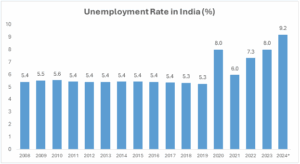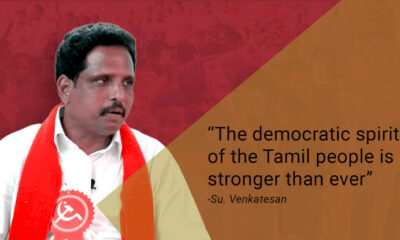Politics
How Madurai is Addressing Unemployment Through Policy

Madurai’s Fight Against Unemployment: Policy-Driven Solutions
Unemployment remains one of the most pressing challenges in India, and Madurai, a historic cultural and commercial hub of Tamil Nadu, is no exception. With its rapidly growing youth population and a mix of urban and semi-urban communities, the city requires innovative strategies to generate sustainable jobs. Recognizing this, policymakers, local authorities, and civic organizations in Madurai have been working to implement forward-looking policies aimed at skilling the workforce, encouraging entrepreneurship, and expanding industries.
This article explores how Madurai is addressing unemployment through targeted policy measures, educational reforms, and job-oriented initiatives.
1. Strengthening Skill Development Programs
One of the core challenges in Madurai’s job market is the mismatch between available skills and industry requirements. To bridge this gap, the city has embraced state and national skill development missions.
Skill Development Centers: Government-run centers in Madurai offer vocational training in fields such as tailoring, computer literacy, healthcare assistance, electrical work, and hospitality.
Partnership with Industries: Local industries and IT parks are collaborating with educational institutions to provide hands-on training and internship opportunities.
Digital Upskilling: Special focus is being given to digital literacy, coding, and e-commerce, enabling youth to adapt to the changing job landscape.
This approach ensures that young people are not only educated but also employable in competitive markets.
2. Boosting Entrepreneurship and Startups
Another powerful strategy to address unemployment in Madurai has been the encouragement of entrepreneurship.
Startup Incubation Hubs: Local government and universities have partnered to launch incubation centers where aspiring entrepreneurs receive mentorship, seed funding, and guidance.
Women Entrepreneurs: Special schemes and subsidies encourage women in Madurai to launch small businesses, from food processing units to online retail ventures.
Local Market Support: Initiatives such as “Made in Madurai” campaigns help promote homegrown products, handicrafts, and traditional industries like textiles and jewelry.
By fostering self-reliance and innovation, Madurai is not only creating jobs but also diversifying its economy.
3. Leveraging Madurai’s Traditional Industries
Madurai is globally known for its cultural and traditional industries. Policies are being tailored to modernize these sectors while ensuring employment for thousands of artisans and workers.
Handloom and Textile Industry: Government subsidies and e-commerce tie-ups are helping Madurai’s handloom products reach wider markets.
Tourism-Linked Employment: With its heritage sites, temples, and festivals, tourism is being leveraged as a job-generating sector. Tour guides, hospitality staff, and cultural performers benefit from training programs linked to tourism policies.
Agro-Based Industries: Policies supporting agro-processing, organic farming, and allied industries are strengthening rural employment around Madurai.
This approach sustains traditional livelihoods while integrating them into modern markets.
4. Expanding Educational and Employment Linkages
Education is at the heart of any employment strategy. Madurai has witnessed reforms that link higher education more directly to employability.
Job Fairs and Campus Drives: Colleges regularly collaborate with companies to host placement events, ensuring that graduates find opportunities in IT, banking, retail, and healthcare.
Vocational Courses: Universities are offering add-on diploma programs in digital marketing, logistics, and business management to enhance employability.
Government Schemes: Programs like “Naan Mudhalvan” empower students to acquire new-age skills and improve their career prospects.
These measures reduce the transition gap between education and employment.
5. Public-Private Partnerships (PPP) in Employment Creation
Policies in Madurai emphasize collaboration between government agencies and private enterprises.
Industrial Corridors: Investments in industrial parks and special economic zones (SEZs) create direct employment opportunities.
Infrastructure Development: Road projects, smart city initiatives, and real estate growth generate large-scale jobs in construction and allied services.
Corporate Social Responsibility (CSR): Many companies operating in Madurai fund training programs and rural development initiatives that indirectly contribute to job creation.
PPP-based employment strategies ensure long-term and sustainable growth.
6. Technology and Remote Work Opportunities
The pandemic highlighted the importance of remote work, and Madurai has been quick to adopt policies that support digital-based employment.
BPO and IT Services: Expansion of business process outsourcing centers in Madurai provides jobs to thousands of educated youth.
Freelancing Platforms: Young professionals are being encouraged to explore freelancing in graphic design, content writing, and IT services.
Digital Infrastructure: Investments in internet connectivity ensure that rural areas around Madurai also benefit from online job opportunities.
This shift is crucial for integrating Madurai into the global digital economy.
Conclusion: A Multi-Dimensional Policy Approach
Madurai’s strategy to address unemployment is not based on a single policy but a blend of skill development, entrepreneurship promotion, modernization of traditional industries, and technological adaptation. By leveraging both its cultural heritage and modern infrastructure, Madurai is creating a balanced employment ecosystem.
While challenges remain—such as underemployment, rural-urban disparities, and the need for continuous industry alignment—the city’s policy-driven approach offers hope for a future where every youth finds meaningful work.
Madurai’s journey demonstrates how cities with strong cultural roots can embrace innovation and progressive policies to empower their workforce and secure long-term economic resilience.







